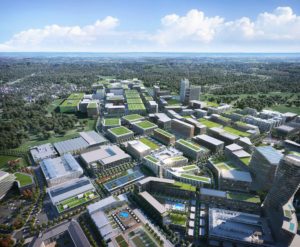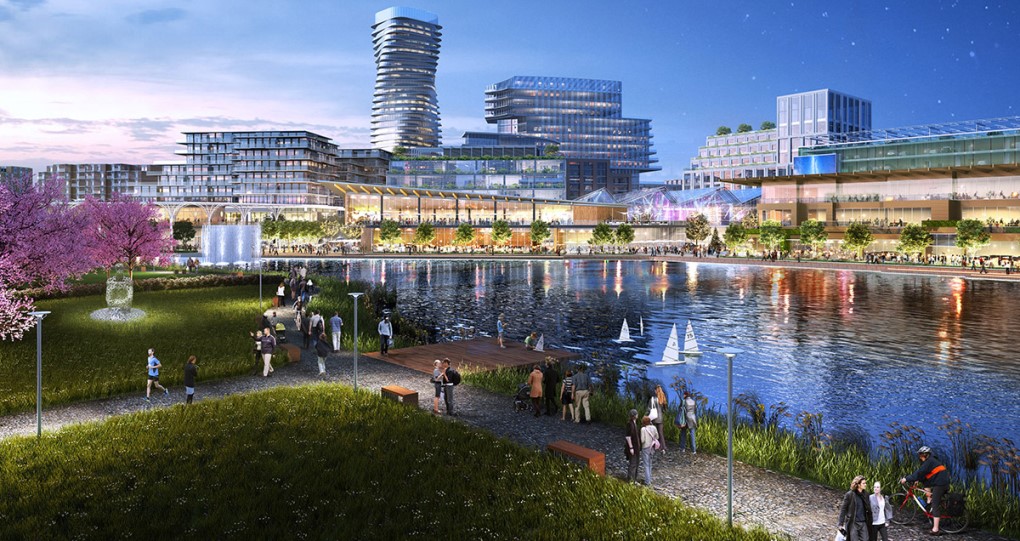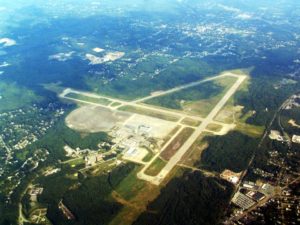Naval Air Station South Weymouth was an operational United States Navy airfield from 1942 to 1997 in South Weymouth, Massachusetts. It was first established as a regular Navy blimp base during World War II. During the postwar era the base became part of the Naval Air Reserve Training Command, hosting a variety of Navy and Marine Corps reserve aircraft squadrons and other types of reserve units.
Environmental contamination from wastes stored in 3 landfills was detected in 1986, and since 1993 the site has been on the National Priorities List of Superfund sites. Numerous remedies and long term monitoring of ground water are in place. Since 2005, over 600 acres have been transferred to the affected towns for reuse, and in 2011 the Navy signed a $25 million contract to transfer its remaining land.
The November 2016 completion of the Bill Delahunt Parkway (documented in this September 1, 2016 article here in REVITALIZATION), which will provide Union Point with an East-West thoroughfare for the first time, was expected to significantly increase the speed of commercial and retail development.
That promise has now come true in a wonderful example of the 3Re Strategy (repurpose, renew, reconnect) at work. That road reconnected the naval air station site, making it financially feasible to repurpose and renew it as a living community.
 Now, after many stops and starts along the way, Union Point is a 1500-acre mixed-use redevelopment of the long-defunct naval air station, situated about 12 miles south of Boston, Massachusetts.
Now, after many stops and starts along the way, Union Point is a 1500-acre mixed-use redevelopment of the long-defunct naval air station, situated about 12 miles south of Boston, Massachusetts.
The resulting community intends to combine active living with “Smart City” design, to offer the advantages of urban density in a supremely livable environment. Union Point will eventually culminate in just under 4000 units of housing and six million square feet of commercial and retail space.
General Electric will use Union Point as a laboratory for testing new products and as a showroom for working systems. Eric Gebhardt, the strategic technology officer at GE Power, said the community’s energy plan will include micro grid technology, renewable generation and power storage. The company will also install “intelligent” lighting — streetlights with sensors that can track sound, light and other conditions. The data can be used to monitor traffic, help drivers find parking spaces and alert law enforcement if a gun is fired.
G.E. has piloted some of its smart products in existing cities, but Union Point is an unusual opportunity because most of the infrastructure does not exist yet and the developer is open to experimentation, Gebhardt explained.
LStar plans to repurpose the air station’s old power plant as an innovation center. The center has expressed an interest in featuring an interactive planning tool developed by the Massachusetts Institute of Technology‘s (MIT) City Science Group called CityScope, which could aid in Union Point’s evolution by allowing users to visualize and explore trade-offs around factors like density, transportation and walkability, says David Rose, a researcher and lecturer at MIT’s Media Lab.
LStar wants “the center to be a showcase for what the city could be, a place to monitor what it is becoming, and a place to ask existential questions like, ‘Could it be more inclusive, say, or energy efficient?’” Rose said.
LStar also has an agreement with Optimus Ride, an autonomous vehicle start-up in Boston, to set up a self-driving vehicle service at Union Point. The company is already testing its electric vehicles at the property.
Union Point is turning a huge dead zone into a new urban environment for the towns of Weymouth, Rockland, and Abington. The Union Point master plan vision – created by Raleigh, North Carolina-based LStar Ventures, Elkus Manfredi Architects, and Sasaki Associates – combines the attributes and energy of a city with natural open spaces.
 Union Point will comprise nearly 4000 homes and apartments and 8 million square feet of commercial development opportunity perfectly balanced with more than 1,000 acres of green space and 50 miles of hiking/biking trails. The site is a transit-oriented development with direct pedestrian access to the South Weymouth Commuter Rail Station. The community’s glass towers, public plazas, clustered housing, scattered parks and retail zones will be contained within 500 acres, leaving the rest as dedicated open space.
Union Point will comprise nearly 4000 homes and apartments and 8 million square feet of commercial development opportunity perfectly balanced with more than 1,000 acres of green space and 50 miles of hiking/biking trails. The site is a transit-oriented development with direct pedestrian access to the South Weymouth Commuter Rail Station. The community’s glass towers, public plazas, clustered housing, scattered parks and retail zones will be contained within 500 acres, leaving the rest as dedicated open space.
Back in September of 2016, LStar announced that they had signed their first anchor tenant for Union Point: Prodrive Technologies, which will move in this Spring. Prodrive, based in the Netherlands, will center its U.S. operations at Union Point, building 550,000 square feet of research and manufacturing space and creating between 300-500 jobs over two phases beginning at the end of 2017. Prodrive, a technology manufacturing firm, is one of the fastest growing private technology companies in Europe.
“Prodrive is a perfect fit for Weymouth,” said State Representative Jamie Murphy. “I am very pleased that this project is bringing with it hundreds of permanent jobs which is exactly what I’ve been advocating for at the former naval air station.”
“We are thrilled to be making Union Point our home for the materialization of our American aspirations,” said Hans Verhagen, Prodrive founder and CEO. “Prodrive has long outgrown the opportunities of its home in Holland and is eager to place its new roots in the thriving technological ecosystem of greater Boston. We are excited to watch Union Point grow from the sprawling field of possibilities that it is into the hub of industry and culture that we are confident it will become. With the fuel of brilliant, ambitious minds flowing out of Boston and our roots in the greenfield of Union Point we look forward to growing quickly and building on our current success.”
“I am excited to welcome Prodrive to Massachusetts, and to the technology and advanced manufacturing ecosystems that continue to innovate and expand in the Commonwealth,” said Massachusetts Secretary of Housing and Economic Development Jay Ash at the time. “This victory for Union Point, and for Massachusetts, was enabled by public infrastructure investments that helped turn a former Naval air station into an economic engine for the South Shore, and one of the largest development opportunities in New England.”
As part of LStar’s efforts to spark commercial development and foster a sense of community, managing partner Kyle Corkum had previously pledged that the first major commercial tenant on the site would receive its land free of charge, in exchange for a commitment to contribute to the technological needs of the local school system in Weymouth. True to its word, LStar will grant Prodrive its first seven-acre parcel free. In exchange, Prodrive will develop a technology curriculum for all levels of public schools in the town.
 “Prodrive is exactly the kind of tenant we have been working to attract to Union Point,” said Corkum. “They are going to create hundreds of engineering jobs and anchor our town center for years to come, while also making a tremendous contribution to the local schools.”
“Prodrive is exactly the kind of tenant we have been working to attract to Union Point,” said Corkum. “They are going to create hundreds of engineering jobs and anchor our town center for years to come, while also making a tremendous contribution to the local schools.”
“Prodrive’s announcement that it is coming to Weymouth shows just what is possible when a community rolls up its sleeves and does the serious work needed to fix a project that wasn’t working,” said Weymouth Town Councilor TJ Lacey. “This is a good day for Weymouth.”
“Today’s announcement restores my faith in the project,” said House Majority Leader Ron Mariano back in 2016. “I have long been confident that the completion of the road would lead to increased business interest in Union Point. This is a great step forward and I’m pleased with how quickly it has come together.”
Corkum praised local officials for their efforts to make Union Point a success. “This could not have happened without the contributions of our political leaders and neighboring communities in Weymouth, Abington and Rockland,” Corkum said. “For 18 months we have been working with the towns, with the residents of Union Point, and with the Southfield Redevelopment Authority to clear the path to tremendous commercial growth and economic development. Today marks the first wave of agreements, and we look forward to making additional announcements on major tenants in the months ahead.”
“This is great news for Weymouth and the South Shore,” said State Senator and Weymouth Town Council President Patrick O’Connor. “This deal establishes the commercial viability of Union Point and will serve as a job catalyst for the entire region.”
“Prodrive is exactly the type of job creation that I’ve wanted to see at this site,” said Weymouth Town Council Vice President Michael Smart. “Prodrive is a quality company that will provide great permanent jobs. It’s not just good news. It’s awesome news. The success of Union Point is vital to the Town of Weymouth and the South Shore’s economic growth.”
“This deal demonstrates how important it was for the three towns to change the governance structure of the project,” said Ed Kimball, chairman of the Rockland Board of Selectmen. “Rockland looks forward to future opportunities to compete for commercial prospects that will provide jobs and economic growth for the entire South Shore.”
 “My Administration has been working hard to attract business to Weymouth and expand our commercial base,” said Weymouth Mayor Robert Hedlund. “Prodrive’s arrival is a culmination of that effort. The legislation of two years ago to fix the Southfield governance model is now paying dividends and we have shown that Weymouth has what it takes to support high quality technology job creation.”
“My Administration has been working hard to attract business to Weymouth and expand our commercial base,” said Weymouth Mayor Robert Hedlund. “Prodrive’s arrival is a culmination of that effort. The legislation of two years ago to fix the Southfield governance model is now paying dividends and we have shown that Weymouth has what it takes to support high quality technology job creation.”
“This announcement really shows that we did the right thing when we adopted the new zoning plan this spring,” said Maureen Janson, chairperson of the Abington Board of Selectmen in 2016. “It validates our vision and the jobs that this project will create is good news for everyone.”
The redevelopment is being led by LStar Ventures, with master planning and design provided by Elkus Manfredi Architects. “The three towns recognized an opportunity to do something quite extraordinary” on a site where previous development plans stalled, said David P. Manfredi, a founding principal at Elkus Manfredi Architects. “This is an alternative to what could have been suburban sprawl.”
All renderings courtesy of Elkus Manfredi Architects.


